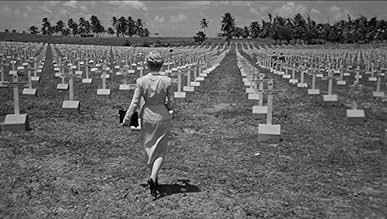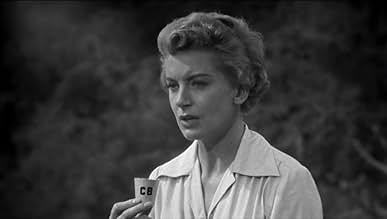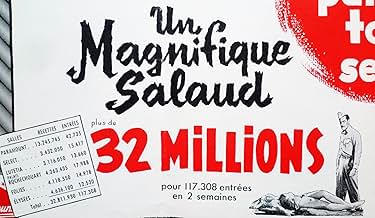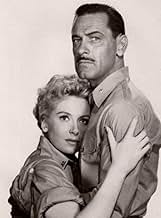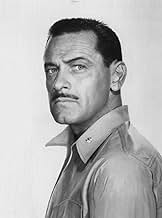En el Pacífico durante la Segunda Guerra Mundial, una viuda católica romana se enamora de un tenaz teniente coronel.En el Pacífico durante la Segunda Guerra Mundial, una viuda católica romana se enamora de un tenaz teniente coronel.En el Pacífico durante la Segunda Guerra Mundial, una viuda católica romana se enamora de un tenaz teniente coronel.
- Dirección
- Guionistas
- Elenco
- Nominado a 2 premios Óscar
- 2 nominaciones en total
Claude Akins
- Big Soldier
- (sin créditos)
Nina Borget
- French Woman
- (sin créditos)
George Brenlin
- Casualty
- (sin créditos)
Lorayne Brox
- Sissie
- (sin créditos)
Evelyn Cotton
- Beth
- (sin créditos)
Maynard Ferguson
- Trumpet Player in Dance Scene
- (sin créditos)
- Dirección
- Guionistas
- Todo el elenco y el equipo
- Producción, taquilla y más en IMDbPro
Opiniones destacadas
This film does capture the negativity of war! It's wonderful to see William Holden play a part where he may not be the most lovable man in the world. It's just as rewarding to see Deborah Kerr as a woman of great beauty and sexuality! I think the acting of all the cast is wonderful! The acting of the chaplain maybe a little over the top( just my opinion.) I wasn't going to watch this film all the way through, however; once I got into it I got hooked!! It is a sad film! But I can't say that any movie about war is to make a person happy!! It is about loss, but there is also some redeeming qualities in the characters. Especially at the end!!!
During WWII, a Red Cross volunteer comes to the South Pacific seeking information about the death of her soldier husband. Kerr is fine as the lonely woman struggling to cope with her loss. This is a strange role for Holden, who usually played characters with integrity. Although the actor is always worth watching, here his character is basically a dishonest heel. It's hard to believe that someone like Kerr, no matter how vulnerable, falls in love with him. Not surprisingly, Ritter steals the film as a tough but caring nurse. The screenplay and direction by Seaton, who worked with Holden on four films, is nothing special, but it's not bad either. The scenery is nice.
Several scenes from "The Proud and the Profane" were shot at my parents' home in St Thomas, USVI, at Estate Frenchman's Bay on the island's southern side. The company bought (and left) an additional refrigerator to make & keep ice for the stars' drinks (it gets hot under the lights in the Caribbean!). I also remember seeing a few huge electric bulbs that apparently were blown out or not worth the expense of shipping back to Hollywood. Since I was in elementary school in the States at the time of shooting, I didn't get to watch any of the production, but heard all the stories when I returned for the summer. "The Frogmen", with Richard Widmark, was also shot on the property (in the bay in front of the house).
The Proud and Profane (1956)
Yes, this movie features William Holden and Deborah Kerr, who do their characteristic best in a lower budget echo of the 1953 blockbuster "From Here to Eternity," also featuring Kerr (but with Lancaster and, for good measure, Montgomery Clift). The comparison is fair, because the similarities are too blatant, and so it's fair to also say that, as ordinary as this movie is, it had potential. There are qualities to the story line that are too moving (wounded soldiers in the Pacific, a widow tracing the last days of her Marine husband's life, a love affair against the rules) and the actors are too fine (add Thelma Ritter as an important third) to just dismiss the whole thing as a mess.
The director, George Seaton, is really a screenwriter, and though he directed a dozen features, none of them are especially memorable. His real fame rests on assisting with several great movies (like "The Wizard of Oz") and with a single brilliant coup--the screenplay for the original 1947 as well as the later TV version of "Miracle on 34th St." And it is no surprise that Seaton's own screen writing in "The Proud and Profane," though prosaic, is very good.
Ah, but filmmaking is about timing, flow, surprise, drama, light, shadow, and sounds of all kinds. This is the director's blank canvas and Seaton doesn't go anywhere in any of these areas. The light is bright and flat. The camera-work is functional and bland (cameraman John Warren being a newcomer, moving quickly to television, including many Hitchcock episodes). The score is strong (thanks to veteran master Victor Young) but there is no attempt to insert diegetic music or more interesting internal sounds. Even the supporting cast is pigeonholed into clichés (and there is no critical secondary male role, as Clift played in the 1953 movie). Thelma Ritter is at her best, more normalized than in other roles, but believable and superb.
I write all this for a routine movie because of Holden, who is an understated and sometimes brilliant actor, and Kerr, who I never warm up to but who is almost designed to be too cold to like. Kerr in particular is up and down here, at times so perfectly cast and so convincing you start to really watch closely, but other times she has to stretch her role a little (when she is dancing, for example, or in the cheesy beach scene early on) and it's awkward. Holden is made to be an enigma, and when he warms up (out of uniform) he's likable, and when he's cold, he's cold, but never admirable, which is what a commander needs to be at least.
I enjoyed this movie because I enjoy movies, but also because it has aspects that are terrific. If you really like war films that aren't about battle (as I do), this is a must see. And if you want perspective on "From Here to Eternity" you really will appreciate both films more. For just a fresh, well-made movie, terrific you will need to keep looking.
Yes, this movie features William Holden and Deborah Kerr, who do their characteristic best in a lower budget echo of the 1953 blockbuster "From Here to Eternity," also featuring Kerr (but with Lancaster and, for good measure, Montgomery Clift). The comparison is fair, because the similarities are too blatant, and so it's fair to also say that, as ordinary as this movie is, it had potential. There are qualities to the story line that are too moving (wounded soldiers in the Pacific, a widow tracing the last days of her Marine husband's life, a love affair against the rules) and the actors are too fine (add Thelma Ritter as an important third) to just dismiss the whole thing as a mess.
The director, George Seaton, is really a screenwriter, and though he directed a dozen features, none of them are especially memorable. His real fame rests on assisting with several great movies (like "The Wizard of Oz") and with a single brilliant coup--the screenplay for the original 1947 as well as the later TV version of "Miracle on 34th St." And it is no surprise that Seaton's own screen writing in "The Proud and Profane," though prosaic, is very good.
Ah, but filmmaking is about timing, flow, surprise, drama, light, shadow, and sounds of all kinds. This is the director's blank canvas and Seaton doesn't go anywhere in any of these areas. The light is bright and flat. The camera-work is functional and bland (cameraman John Warren being a newcomer, moving quickly to television, including many Hitchcock episodes). The score is strong (thanks to veteran master Victor Young) but there is no attempt to insert diegetic music or more interesting internal sounds. Even the supporting cast is pigeonholed into clichés (and there is no critical secondary male role, as Clift played in the 1953 movie). Thelma Ritter is at her best, more normalized than in other roles, but believable and superb.
I write all this for a routine movie because of Holden, who is an understated and sometimes brilliant actor, and Kerr, who I never warm up to but who is almost designed to be too cold to like. Kerr in particular is up and down here, at times so perfectly cast and so convincing you start to really watch closely, but other times she has to stretch her role a little (when she is dancing, for example, or in the cheesy beach scene early on) and it's awkward. Holden is made to be an enigma, and when he warms up (out of uniform) he's likable, and when he's cold, he's cold, but never admirable, which is what a commander needs to be at least.
I enjoyed this movie because I enjoy movies, but also because it has aspects that are terrific. If you really like war films that aren't about battle (as I do), this is a must see. And if you want perspective on "From Here to Eternity" you really will appreciate both films more. For just a fresh, well-made movie, terrific you will need to keep looking.
The combined credits of William Holden and Deborah Kerr will contain the titles of the best films of the Fifties. But The Proud And Profane will never go down in the top 10 list of either of these stars.
Kerr is a Red Cross volunteer sent to New Caledonia which was a major US base in the Pacific War in the Forties. She's a recent widow of a Marine Lieutenant killed at Guadalcanal. Now she's in her grief trying to make some kind of atonement. What we don't need here is women on some kind of pilgrimage as her new supervisor at the Red Cross played by Thelma Ritter points out. In fact Ritter tries many times during the film to give Kerr a reality check.
Holden was her husband's brigade commander and one tougher than usually tough Marine. Apparently her husband was a sensitive sort and Holden is unlike him in just about every way. In fact Holden is brutally frank about wanting to get to know her intimately and does.
After which he undergoes a complete change of heart. And it turns out he's married most unhappily to a woman back in the states.
These two stars had all the chemistry of vinegar and peppermint lifesavers. Funny because very soon Kerr was to be cast with Robert Mitchum in Heaven Knows Mr. Allison where he plays a tough Marine and she a nun. Those two were wonderful on screen together. But no movie magic emanated from the silver screen with Holden and Kerr.
William Redfield plays a chaplain and some of those scenes with Holden were like Spock and McCoy going back and forth. Redfield was way too self righteous in a way DeForest Kelley never was.
Best in the film is Thelma Ritter who many times is just that. And Adam Williams has a small, but key role as a gravedigger and tender in the new cemetery on Guadalcanal. He's the one who finally gives Kerr the ultimate of reality checks.
Definitely a film for fans of the two stars and Thelma Ritter.
Kerr is a Red Cross volunteer sent to New Caledonia which was a major US base in the Pacific War in the Forties. She's a recent widow of a Marine Lieutenant killed at Guadalcanal. Now she's in her grief trying to make some kind of atonement. What we don't need here is women on some kind of pilgrimage as her new supervisor at the Red Cross played by Thelma Ritter points out. In fact Ritter tries many times during the film to give Kerr a reality check.
Holden was her husband's brigade commander and one tougher than usually tough Marine. Apparently her husband was a sensitive sort and Holden is unlike him in just about every way. In fact Holden is brutally frank about wanting to get to know her intimately and does.
After which he undergoes a complete change of heart. And it turns out he's married most unhappily to a woman back in the states.
These two stars had all the chemistry of vinegar and peppermint lifesavers. Funny because very soon Kerr was to be cast with Robert Mitchum in Heaven Knows Mr. Allison where he plays a tough Marine and she a nun. Those two were wonderful on screen together. But no movie magic emanated from the silver screen with Holden and Kerr.
William Redfield plays a chaplain and some of those scenes with Holden were like Spock and McCoy going back and forth. Redfield was way too self righteous in a way DeForest Kelley never was.
Best in the film is Thelma Ritter who many times is just that. And Adam Williams has a small, but key role as a gravedigger and tender in the new cemetery on Guadalcanal. He's the one who finally gives Kerr the ultimate of reality checks.
Definitely a film for fans of the two stars and Thelma Ritter.
¿Sabías que…?
- TriviaFeature-film debut of Frank Gorshin playing the uncredited role of "Harry." In the film's opening at dockside, just after Lee arrives, Kate stops to talk to Harry about obtaining a can of paint off his truck.
- ErroresThe US Army Air Force C-47 cargo planes are painted in post WWII paint scheme rather than the wartime green. When the Air Force became a separate service in 1947 the white over bare metal paint scheme as seen in the movie was adopted.
- Citas
Chaplain Lt. (jg) Holmes: It must be wonderful to feel that one has lived such a perfect life... that forgiveness has never been necessary.
Selecciones populares
Inicia sesión para calificar y agrega a la lista de videos para obtener recomendaciones personalizadas
- How long is The Proud and Profane?Con tecnología de Alexa
Detalles
Taquilla
- Total en EE. UU. y Canadá
- USD 3,900,000
- Tiempo de ejecución1 hora 51 minutos
- Color
- Relación de aspecto
- 1.85 : 1
Contribuir a esta página
Sugiere una edición o agrega el contenido que falta


